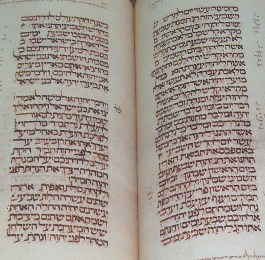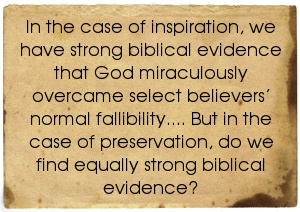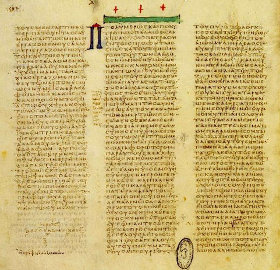Let the Minutiae Speak
 The place of genealogies, numbers, and parallel passages in the King James only debate
The place of genealogies, numbers, and parallel passages in the King James only debate
“Things that are different are not the same.” So says the title of Mickey Carter’s book advocating the exclusive use of the King James Bible. This sentiment is a fair summary of the mindset of most King James only (KJO) advocates. The differences between Bible versions demand a judgment. Which Bible is right?
Troubled by differing Bible versions, many sincere Christians seek for answers. One side affirms that no doctrine is affected by the relatively minor differences between Bible versions. The message is the same, but finer points and particular details may be slightly different. A typical KJO position jumps in and says this can’t be right. Verbal inspiration is useless without the preservation of those very words of God. In fact, we need to know each and every word, in order to live (Matt. 4:4). All differences, even word order and spelling differences, matter (Matt. 5:18). Differing versions cannot both claim to be translations of the perfect, inspired Word of God.
On the face of it, the KJO argument makes sense. When we’re speaking about the Bible, shouldn’t every little difference matter? Some respond with manuscript evidence that calls into question the choice of the King James Bible as a perfect standard. Others have shown that the various proof texts for word perfect preservation don’t actually promise a single, identifiable, word-perfect copy of the Bible. And prior to 1611, where was such a copy to be found, anyway?
Discussion
Preservation: How and What? Part 3
Does the Bible teach that God’s people will always be able to point to a particular text1 of the Bible and know that it is the word-perfect, preserved text? Those who believe a particular choice of translations is “the biblically right” option, tend to answer (passionately) in the affirmative. But many who use other translations or simply prefer the KJV are not so sure. Who is right?
Points of agreement
Nearly all involved in the controversy are agreed that God has preserved His Word for us in some sense. Nearly all are agreed as well that Scripture teaches God will preserve forever, somewhere and in some form, every one of the words He inspired and that some believers will always have access to Scripture in some form. God’s ability to use imperfect sinners to perfectly preserve His Word is also not in dispute, nor is the fact that we should accept what the Bible reveals to be true regardless of the claims of the “science of textual criticism” or any “high thing that exalteth itself against the knowledge of God” (2 Cor. 10:5, KJV).
Discussion
Preservation: How and What? Part 2
 Read Part 1.
Read Part 1.Fundamentalists and conservative evangelicals believe God has preserved His word. The debate among them is mainly over the manner of preservation and the form the preserved word has taken. Some believe we have a God-preserved, word-perfect text we can identify with certainty. Others believe we do not.
Those who hold to identifiable, word-perfect preservation cite several passages in support of their doctrine. Part 1 of this series examined several of the strongest of these to see what they they actually teach.1 I concluded that these passages lead us to believe God will preserve His word perfectly in a form that is at least potentially discoverable, but that they do not promise that God’s people will always be able to point to a particular manuscript or text and confidently claim it is the word-perfect, preserved text.
Others have examined these passages (and others) and come to very similar conclusions (Moritz, 86-88; Beacham and Bauder, 116-123; Williams and Shaylor, 83-111), and defenders of certainly-identifiable, word-perfect preservation have responded with counterarguments and accusations. Many of these obscure the real issues in the debate and attempt to frame it in a way that heavily favors their view.
Discussion
Preservation: How and What?
 The doctrine of preservation of the Scriptures has been hotly debated in recent years. Much has been written and said, but most of the rhetoric on the subject has been closely connected to defending or rejecting one view or another on the translation issue. The result has often been that important foundational questions have been overlooked in a rush to get to conclusion A or B in the translation debate.
The doctrine of preservation of the Scriptures has been hotly debated in recent years. Much has been written and said, but most of the rhetoric on the subject has been closely connected to defending or rejecting one view or another on the translation issue. The result has often been that important foundational questions have been overlooked in a rush to get to conclusion A or B in the translation debate.
Among the neglected questions are these: (1) what process did God say He would use to preserve His word and (2) what form did He say that preserved word would take? Both of these are subsets of another neglected question: What does Scripture actually claim (and not claim) about it’s own preservation?
The questions of process (“how”) and form (“what”) are at the heart of the controversy because nobody (among fundamentalists or conservative evangelicals) denies that the word has, and will, endure. The question of what Scripture actually claims is critical as well, for multiple reasons. For one, only a clear answer to that question can put us on the right track to answering the others.
Two general schools of thought exist regarding the how and what of preservation.
 Read
Read  Read
Read 
Discussion